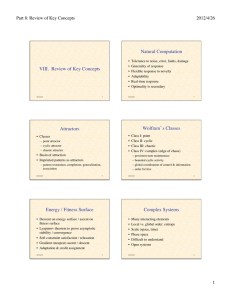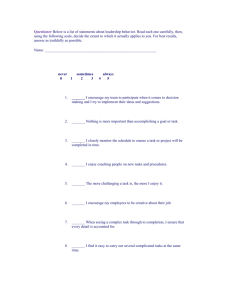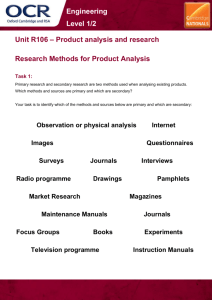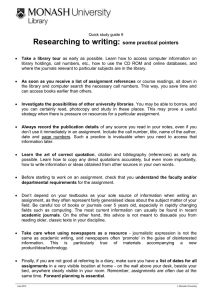Document 11911360
advertisement
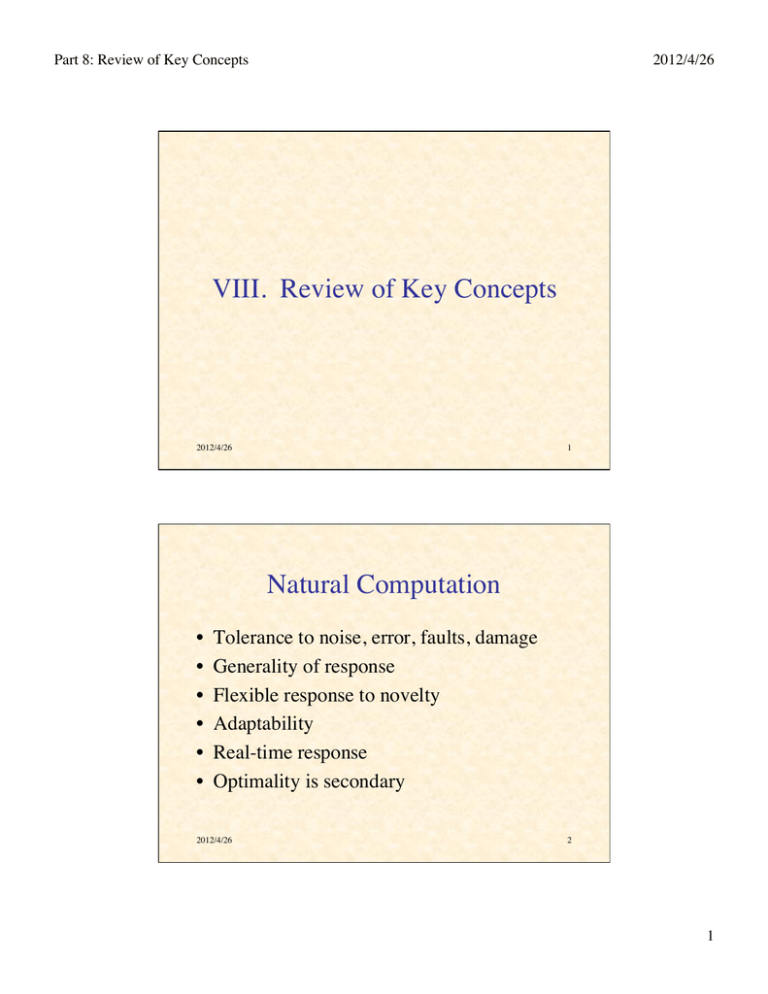
Part 8: Review of Key Concepts 2012/4/26 VIII. Review of Key Concepts 2012/4/26 1 Natural Computation • • • • • • Tolerance to noise, error, faults, damage Generality of response Flexible response to novelty Adaptability Real-time response Optimality is secondary 2012/4/26 2 1 Part 8: Review of Key Concepts 2012/4/26 Attractors • Classes – point attractor – cyclic attractor – chaotic attractor • Basin of attraction • Imprinted patterns as attractors – pattern restoration, completion, generalization, association 2012/4/26 3 Wolfram’s Classes • • • • Class I: point Class II: cyclic Class III: chaotic Class IV: complex (edge of chaos) – persistent state maintenance – bounded cyclic activity – global coordination of control & information – order for free 2012/4/26 4 2 Part 8: Review of Key Concepts 2012/4/26 Energy / Fitness Surface • Descent on energy surface / ascent on fitness surface • Lyapunov theorem to prove asymptotic stability / convergence • Soft constraint satisfaction / relaxation • Gradient (steepest) ascent / descent • Adaptation & credit assignment 2012/4/26 5 Complex Systems • • • • • • Many interacting elements Local vs. global order: entropy Scale (space, time) Phase space Difficult to understand Open systems 2012/4/26 6 3 Part 8: Review of Key Concepts 2012/4/26 Many Interacting Elements • Massively parallel • Distributed information storage & processing • Diversity – avoids premature convergence – avoids inflexibility 2012/4/26 7 Complementary Interactions • • • • • Positive feedback / negative feedback Amplification / stabilization Activation / inhibition Cooperation / competition Positive / negative correlation 2012/4/26 8 4 Part 8: Review of Key Concepts 2012/4/26 Biased Randomness • • • • • • Exploration vs. exploitation Blind variation & selective retention Innovation vs. incremental improvement Pseudo-temperature Diffusion Mixed strategies 2012/4/26 9 Pattern Formation • • • • • Excitable media Amplification of random fluctuations Symmetry breaking Specific difference vs. generic identity Automatically adaptive 2012/4/26 10 5 Part 8: Review of Key Concepts 2012/4/26 Emergence & Self-Organization • Microdecisions lead to macrobehavior • Circular causality (macro / micro feedback) • Coevolution – predator/prey, Red Queen effect – gene/culture, niche construction, Baldwin effect 2012/4/26 11 Stigmergy • Continuous (quantitative) • Discrete (qualitative) • Coordinated algorithm – non-conflicting – sequentially linked 2012/4/26 12 6 Part 8: Review of Key Concepts 2012/4/26 Emergent Control • Stigmergy • Entrainment (distributed synchronization) • Coordinated movement – through attraction, repulsion, local alignment – in concrete or abstract space • Cooperative strategies – nice & forgiving, but reciprocal – evolutionarily stable strategy 2012/4/26 13 Doing Research in Bio-inspired Computation 2012/4/26 14 7 Part 8: Review of Key Concepts 2012/4/26 Keeping Abreast of Research • An interdisciplinary field, so it’s not sufficient to read just computing journals • General science: to keep abreast of potentially relevant research • Complex systems: integrative and overarching research • Specific bio-inspired journals: neural networks, cognitive science, evolutionary computing, artificial life, swarm intelligence, etc. • There are more journals than you can read, so subscribe to science news feeds, etc. 2012/4/26 15 General Science Journals • Science (AAAS) – via library you have full internet access – go to www.sciencemag.org for podcasts, webinars, etc. • Nature – via the library you have full internet access – go to www.nature.com for podcasts, etc. – also Nature Neuroscience, Nature Reviews Neuroscience, etc. • Science News, Scientific American, Scientific American Mind, etc. 2012/4/26 16 8 Part 8: Review of Key Concepts 2012/4/26 Journals Especially Relevant to Bio-inspired Computing • • • • Natural Computing Artificial Life Adaptive Behavior Int. Journ. Bio-inspired Computation • Intl. Journ. of Unconventional Computing • many neural network journals • Physica D • Advances in Complex Systems • Biological Cybernetics • Complex Systems (Wolfram) • Intl. Journ. of Nanotechnology and Molecular Computation (which I edit) 2012/4/26 17 Student Course Evaluation! 2012/4/26 18 9
